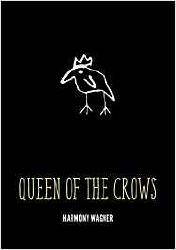Review
Queen of the Crows
- Harmony Wagner
- Acorn Press, 2016

Hungry and afraid when her mother fails to come home yet again, Elsa finds comfort in a crow that seems to be following her — until that crow talks to her. As Elsa tries to hold her precarious life together, she is drawn into a life-or-death battle for dominance among the local crows. Watching the crows resolve their crisis, Elsa learns that birds and people aren’t so different after all.
Eleven-year-old Elsa is incredibly resourceful. She knows she’s growing up too quickly because of her mother’s illness, but loyalty and fear prevent her from reaching out for help. She’s fairly nimble at deflecting attention from herself in the adult world, but at school she is the target of bullying by mean girls, as well as by a teacher who misrecognizes Elsa’s struggle to hold her tiny family together as either stupidity or an indifference to schooling. (I was impressed the author included this point in the narrative, because it’s a topic rarely acknowledged by teachers or even in teacher training.) Elsa is remarkably warm-hearted for a young person in such dire circumstances, as readers will observe through a subplot that involves the integration of Karen refugees into Canadian society; and while her life isn’t going to improve immediately, at the story’s end Elsa is stronger and wiser.
The crow story centres around Cracks, who introduces himself as a jester; this plot provides an imaginative counter-narrative to Elsa’s bleak experiences. The Queen of the Crows has disappeared, and the rest of the crows, including the Queen’s court, are unsettled. When a power vacuum appears, an older, scheming crow called Lustre attempts to exploit the flock’s distress. The reason for the Queen’s absence, however, underlines how the resolve of a supposed outsider can mask something valuable and rare.
This closely observed realistic fiction is nicely balanced with animal fantasy for middle-grade readers. Queen of the Crows is Harmony Wagner’s first novel (it’s based on a film), so there are admittedly a few rough spots, but the larger story is compelling enough to keep readers going. That said, this is a tough plot that doesn’t pull back from the harsh reality of Elsa’s circumstances, so it’s best suited to readers who will give Elsa a chance. Adults should also be prepared to answer questions readers may have about Elsa’s situation.
Readers who have enjoyed books like Brian Jacques’s Redwall series and who are ready for plots based in realism, diversity, and social justice should enjoy this novel. The themes of loyalty and independence will resonate, and regrettably the issue of bullying is still relevant in classrooms across the country. Queen of the Crows is a poignant story of poverty, hardship, and resilience that will reward attentive, sensitive readers.
This review was originally published in Resource Links on April 2017.
